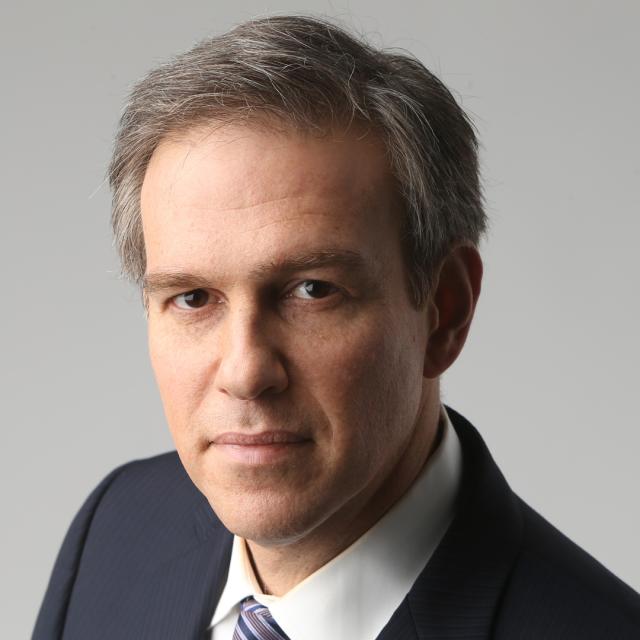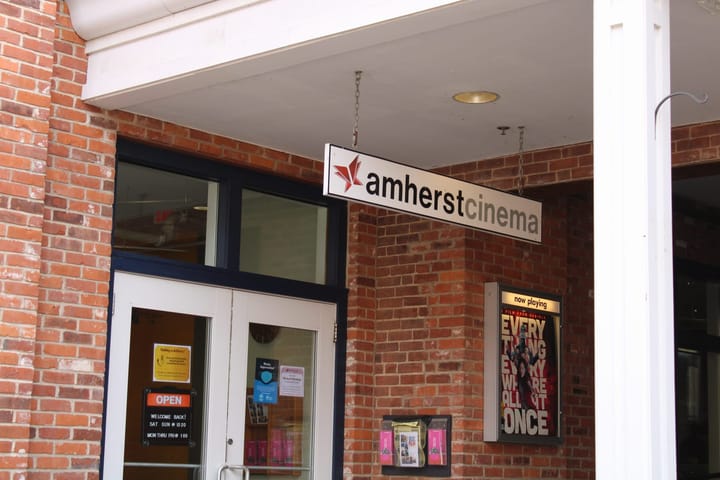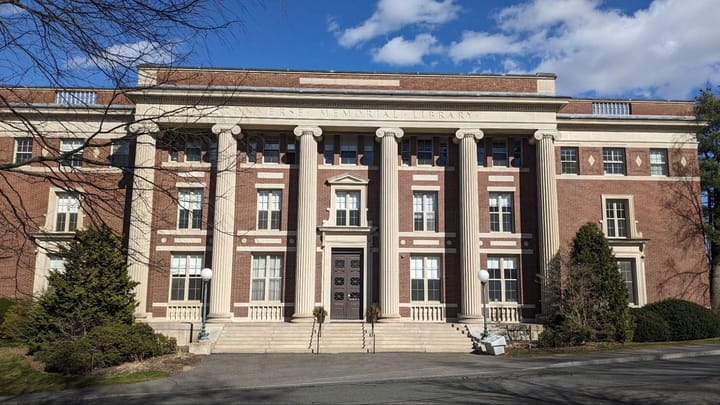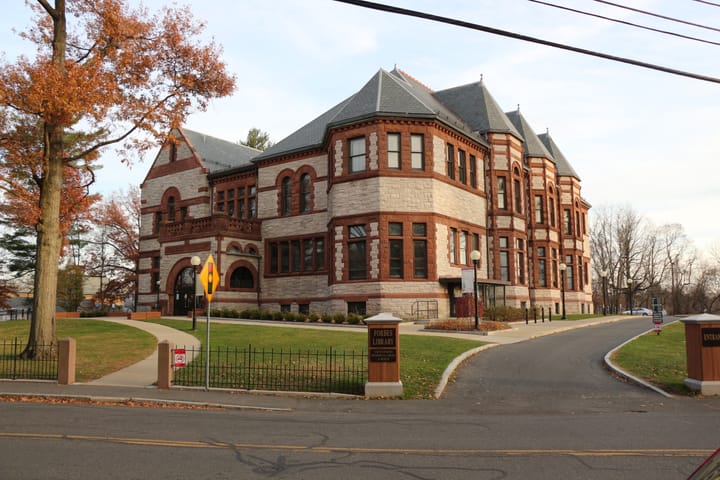Columnist Bret Stephens Defines Terms, Discusses Israel-Palestine Conflict
Last Wednesday, conservative columnist Bret Stephens spoke about Hamas’ Oct. 7 attack, the ensuing violence in Gaza, and the overlap between anti-Israel sentiments and antisemitism. His presence sparked controversy and the organization of counter-programming.

Bret Stephens, a conservative columnist for The New York Times who has frequently sparked controversy for his public remarks, spoke about the Oct. 7 attacks and the ensuing violence in Israel and Palestine before a packed Stirn Auditorium on the night of Wednesday, Nov. 29.
Stephens was the second in a series of speakers on the conflict co-sponsored by the Office of the President and the Office of the Provost and Dean of the Faculty.
He spoke about the “cynicism” of Hamas, which he sees as having little concern for its civilian population; questioned the use of terms like “occupation” and “apartheid” to describe Israel and its control over the West Bank and Gaza; argued that the deaths of Gazan civilians, while unfortunate, would ultimately be justified by the goal of eradicating Hamas; and discussed the way that some anti-Israel discourses can bleed into antisemitism.
He also expressed his distaste for Israeli Prime Minister Benjamin Netanyahu, whose attempt to erode the power of Israel’s judicial branch left the country bitterly divided earlier this year, and his disapproval of parts of the far-right settler movement.
“When the history of the Jewish people is written in 1,000 years, he will go down as one of the very bad kings of Israel,” he said of Netanyahu.
The decision to invite Stephens, announced in an email to students from the president’s office on Nov. 16, prompted strong criticism from some students and professors.
On Nov. 20, Associate Professor of Philosophy Rafeeq Hasan published a letter in The Student criticizing the choice to invite Stephens and the lack of pro-Palestine voices among the speakers so far announced by the President’s Office.
After the return from Thanksgiving Break, students covered up posters promoting the event with flyers containing several quotes from Stephens. The flyers described Stephens as Islamophobic, accused him of denying climate change, and referenced a controversial instance when the columnist referred to “thuggish elements” in the Black Lives Matter movement.
On the day of the event, Amherst for Palestine, Amherst Jews for Ceasefire, the Muslim Student Association, and the Black Student Union hosted a panel discussion at virtually the same time as Stephens’ talk. Both events overflowed the capacity of their venues.
In Stirn, the discussion, moderated by Professor of Law, Jurisprudence, and Social Thought Lawrence Douglas, a scholar of genocide, steered clear of Stephens’ past controversies and focused on the violence in Israel and Palestine, to which Stephens has dedicated his column since Oct. 7.
Much of Stephens’ discussion with Douglas focused on the various terms often used in debates about Israel and Palestine, including “apartheid,” “occupation,” and “antisemitism.”
In an interview with The Student, Douglas said he focused on these terms because he feels that discussions of the conflict are often muddied by confusion over definitions.
“There are so many times where people are using [these terms] in mutually contradictory ways and not being aware of it,” he said. “If you don’t understand how he’s defining these terms, these positions can be unintelligible.”
Stephens said that as a descriptor of Israel “the term ‘apartheid’ is simply wrong, and it’s wrong in terms of the way it diminishes the evil of the actual apartheid system that existed in South Africa”.
He talked about the presence of Arab doctors and nurses in Israel’s hospitals, Palestinian students in its universities, and Arab members of its parliament.
“None of this would have existed in apartheid South Africa,” he said.
As for “occupation,” Stephens drew a distinction between claims about the West Bank and Gaza and other territories captured by Israel in the Six-Day War, in 1967, and a more expansive, and to him concerning, notion of occupation that includes all Israeli territory.
“The second version of occupation is the Hamas version which is, ‘Everything is occupied,’” he said. “All of Israel is a form of occupation, and the only way you end the occupation is you end Israel itself.”
In response to a question about antisemitism and anti-Zionism, Stephens drew a distinction between criticism of Israel’s policies and anti-Zionism, which challenges the very idea of a Jewish state. He emphasized what he saw as the similarities between European antisemitism and contemporary anti-Zionism, both of which see Jews as “foreigners” and “swindlers.”
“To the 19th-century antisemite, the Jew was from the Middle East, and to the 21st-century anti-Zionist, the Jew is from Europe, from the West,” Stephens said.
Stephens also spoke to his worries that, in the wake of Oct. 7, pro-Palestinian protestors are increasingly abandoning the goal of a two-state solution in favor of the total dismantling of the Israeli state.
“What you saw in protests around the world wasn’t people marching and saying it’s time for a Palestinian state alongside Israel,” he said. “The slogans that came out across the board, on college campuses and the streets of London and Sydney and elsewhere, was the message of Hamas, which is ‘we are searching for the destruction of the State of Israel.’”
When asked how the Israeli government can minimize civilian casualties while achieving its goal of eradicating Hamas, Stephens turned to humor.
“It’s like the joke about how porcupines make love,” he said. “With extreme caution.”
Later, in response to a student question, he said that civilian casualties are simply the unfortunate reality of war. (Questions for Stephens could only be submitted via notecard, and questions were vetted by Provost Catherine Epstein before being handed up to Douglas.)
“It is worth remembering that when the United States and its allies went into Germany in 1944 and 1945, they exacted a horrific price in civilian lives,” he said. “Can you justify every single act, say the bombing of Dresden? I don’t know. Was it worth it in terms of the defeat of Nazism? I think so.”
“It’s the same question with the Japanese,” he added.
As for whether the deaths of Palestinian civilians were justified, he referenced his recent experience watching violent footage from Hamas’ Oct. 7 attack.
“My answer is yes, it is justified, if the ends are to eliminate a group whose intention vis a vis Israel is what I witnessed.”
Reflecting on the event, Ruth Zuraw ’25, a Jewish student who identifies as politically liberal and a Zionist, said she was disappointed when the Stephens event was announced.
“When this is the Zionist speaker we’re going to have on campus, and he’s . . . right-wing, you’re kind of imposing the left-wing — right-wing polarization onto an issue that isn’t necessarily divided by that,” she said. “So that was my immediate concern, that any student who agreed with some of his opinions on Israel would be deemed conservative.”
That said, she ultimately thought that “it was productive to have a voice like that on campus,” though she took some issue with the moderation.
“I don’t think Douglas’ questions pushed back enough,” she said, comparing the talk to last month’s event with Mohammed el-Kurd, a Palestinian journalist. “That was kind of a similar setting, where you have this conversation that isn’t actually a conversation.”
Daniya Ali ’25, who also attended the talk, said she agreed about the lack of pushback.
“If you are going to bring in a speaker that is as controversial as he is, you have to ask questions that push the conversation forward,” she said. “He didn’t really ask . . . any tough questions.”
She wished there had been more discussion of the “power dynamic between the two players.”
For his part, Douglas said that he did feel he challenged Stephens with questions about ways to reduce the “humanitarian catastrophe” in Gaza and regarding the realities of “asymmetric warfare.”
He also said that repeatedly challenging Stephens would not have been productive.
“I don’t think the idea was to create some kind of debate forum,” he said. “I usually don’t think those are particularly helpful ways to move forward on a topic.”
Zuraw also said that she wished the speaker panel organized by pro-Palestine student groups had been scheduled for a different time.
“I understood that the point of the other event was counter-programming,” she said. “I wish that that counter-programming had been after or before, because I would have gone to both.”
Ali, who was involved in the planning of the counterprogramming, said she agreed that it would have been better if the events were at different times so students could attend both.
Overall, although she said that “some of the language he used throughout the talk made me a little upset,” Ali said that she was happy she went to hear the kinds of pro-Israel arguments she less often engages with.
“I feel like it's important to understand the other side's arguments,” she said, “to be able to see where they’re coming from or why they think the way that they do or maybe even to learn something from them.”





Comments ()